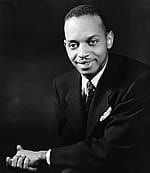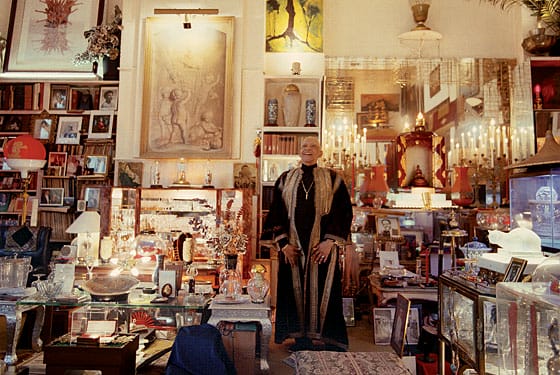
Donald Shirley,
(1927 - 2013) concert pianist, and composer Carnegie Hall Apartment
resident since 1956
and recipient of the Isaac Stern Medallion, the only studio tenant besides
Leonard Bernstein to play solo concerts at Carnegie Hall. He played as soloist
with the orchestra at Milan's La Scala opera house in a program dedicated to
Gershwin's music. Only two other pianists have performed there as
soloists—Rubinstein and Richter. Igor Stravinsky has said of him, "His
virtuosity is worthy of Gods." Appearances in New York followed, notably at the
Basin Street, where Duke Ellington first heard him. Here started their warm
friendship which was highlighted by Don's performance in 1955 of the premiere of
Duke's Piano Concerto at Carnegie Hall with the NBC Symphony of the Air. An
appearance on the Arthur Godfrey Show launched his career nationwide. He has
composed 3 symphonies, two piano concerti, a cello concerto, three string
quartets, a one-act opera, works for organ, piano and violin, a symphonic tone
poem based on "Finnegan's Wake" and a set of "Variations" on the legend of
Orpheus in the Underworld.
from:
http://carnegieartiststudios.com/portfolio.html
Trio Member: Ken Fricker, Juri Taht

Shirley in his Carnegie Hall Apartment.
Following from :
http://www.joyousjam.com/jamaicasclassicalmusicians/id17.html
Don Walbridge Shirley was born in Kingston,
Jamaica, on January 29, l927. He began playing the
piano at age of 2 ˝, being taught at first by his
mother; he gave his first public performance at the
age of 3. When he was 9 he was invited to study
theory with Mittolovski at the Leningrad
Conservatory of Music, where he spent a great part
of his youth. Later he studied with the famous
organist Conrad Bernier and studied advanced
composition with Bernier, and with Dr. Thaddeus
Jones at Catholic University of America in
Washington D. C.
He made his concert debut at the age of 18 with
the Boston Pops on June 25, 1945, playing the
Tchaikovsky B-flat minor concerto. His first major
composition was performed by the London Philharmonic
Orchestra in l946. In l949 he was invited by the
Haitian government to play at the Exposition
International du Bi-Centenaire De Port-au-Prince and
gave a repeat performance at the request of
President Estime.
At this period he gave up his career as a concert
pianist and turned to the academic field where he
achieved outstanding successes. He obtained
Doctorates in Music, Psychology (Univ. of Chicago,
Phi Beta Kappa), and Liturgical Arts. He speaks
eight languages fluently, and is considered an
expert painter as well.
While teaching Psychology at the University of
Chicago in the early 50's he returned to a musical
career, virtually by accident, as a result of being
given a grant to study the possible relationship
between music and the juvenile crime wave which had
broken out in the early l950's. Working in a small
club, he used his experience to perform experiments
in sound, and showed that certain tonal combinations
affected the reactions of the audience. His audience
did not know of his experiment, or of the students
planted among them to assess their reactions, but he
became a sensation as a pianist!
He started making appearances in New York,
especially at the Basin Street, where he played with
Duke Ellington. They began a warm friendship,
resulting in Don's performance of the premiere of
Duke's Piano Concerto at Carnegie Hall with the NBC
Symphony of the Air in l955. An appearance on the
Arthur Godfrey Show launched his career nationwide.
At Arthur Fiedler's invitation he had appeared
with the Boston Pops in Chicago in June 1954. He has
appeared as soloist with the Detroit Symphony, the
Chicago Symphony, the Cleveland Orchestra, the NBC
Symphony, and the National Symphony Orchestra of
Washington to name only a few. He also played as
soloist with the orchestra at Milan's La Scala opera
house in a program dedicated to Gershwin's music.
Only two other pianists have performed there as
soloists - Rubinstein and Richter. Including his
appearances with his own trio, he averaged some 95
concerts a year.
He has written symphonies performed by the
Philadelphia Orchestra and the New York
Philharmonic, and has composed 3 symphonies, two
piano concerti, a cello concerto, three string
quartets, a one-act opera, works for organ, piano
and violin, a symphonic tone poem based on
"Finnegan's Wake" and a set of "Variations" on the
legend of Orpheus in the Underworld.
Don Shirley's music is beyond conventional
categories. He is a virtuoso, playing everything
from show tunes, to ballads, to his personal
arrangements of Negro spirituals, to jazz, and
always with the overtone of a classically-trained
musician who has utmost respect for the music he is
playing. Don's piano style is basically attributed
to his using the piano as a stringed instrument
rather than a percussion instrument which enables
him to have a flexible, subtle voice. He has said,
"There are three ways to enjoy or to interpret
music, from a listening point of view: emotionally,
intellectually, and a combination of the two." Igor
Stravinsky has said of him, "His virtuosity is
worthy of Gods.”
|

